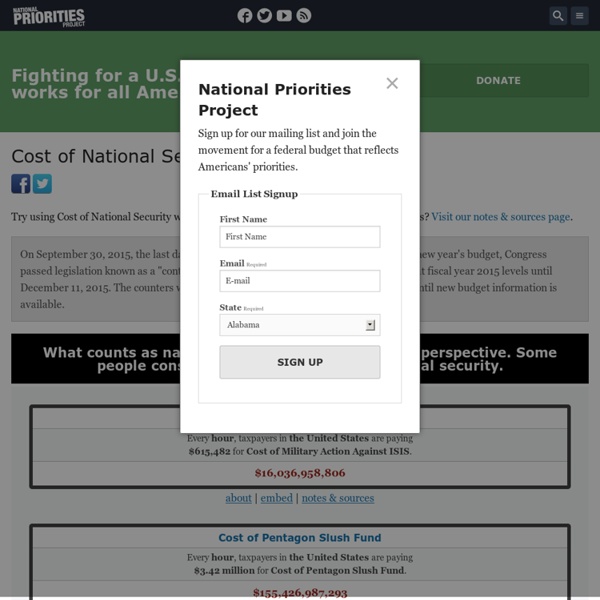Shadow Government Statistics - Home Page
Home | Homeland Security & Governmental Affairs Committee
Security Studies Program (SSP)
A Defense Concept for Ukraine This paper was written by Professor Barry R. Posen twenty years ago. It was never published in English. Though the order of battle assumptions are no longer accurate, the basic architecture of the military problem remains. Those following events in Ukraine may find the analysis useful. In the News Marine Corps Recruit Depot San Diego paper has a writeup of the recent SSP field trip: "MIT students tour depot, leave impressed," April 4, 2014. Daryl Press's book, Calculating Credibility, was cited in a March 7, 2014 CNN article about the Ukraine crisis titled "Enough with the tough guy debate," and in the New York Times, March 15, 2014, in an article titled "Crimea Through a Game-Theory Lens." Carol Saivetz in NECN segment titled "Foreign policy expert: Russia should not take further action in Ukraine," March 3, 2014. New Publications Paul Staniland, Networks of Rebellion: Explaining Insurgent Cohesion and Collapse, Cornell University Press, 2014.
Zombie Hasbara: 'World War Z' and Hollywood’s Zionist embrace
Zombies rush the wall in World War Z. I went to the Drive-In in Atlanta Friday night, to celebrate a friend’s birthday, a beautiful night under an almost full moon. We watched This is The End and Fast and Furious 6, and two of us stayed for the 2:00 am screening of World War Z. The Times of Israel may be only slightly exaggerating when it calls this “the greatest piece of cinematic propaganda for Israel since Otto Preminger’s “Exodus.” The film Spoiler Alert: In order to deconstruct this bizarre interlude into politics at the movies, I will need to reveal most of the plot points, so read on at your own risk. Pitt plays Gerry Lane, a semi-retired UN worker who reluctantly is drawn back into the field to save his family and all of humanity. Gerry’s already informed the audience that wall building is natural to Israel, so the reinforcement of ancient and Separation Walls is plausible, and comes as not at all veiled justification of Israel’s current and widely condemned Apartheid Wall. Notes
This Can't Be Happening! | '...a major destabilizing influence'
Berghuis v. Thompkins (08-1470)
Appealed from the United States Court of Appeals for the Sixth Circuit (Nov. 19, 2008) Oral argument: March 1, 2010 In February of 2001, Southfield, Michigan police officers questioned Van Chester Thompkins (“Thompkins”) for roughly three hours about a shooting that had occurred over one year prior. Although Thompkins remained silent for much of the interrogation, he ultimately provided police with incriminating statements. Questions presented I. II. top Issue Whether a state court’s determination that a defendant’s Fifth and Sixth Amendment rights were not violated — where he was interrogated for three hours while silent before making an incriminating statement and where his lawyer failed to request a limiting instruction — is entitled to deference under 28 U.S.C. § 2254. Facts On January 10, 2000, Samuel Morris and Frederick France were shot repeatedly while driving through a strip mall parking lot in Southfield Michigan. Discussion Miranda’s Right to Remain Silent Analysis
Detainee Treatment | Task Force On Detainee Treatment
Schneier on Security
Cold War II by Noam Chomsky
These are exciting days in Washington, as the government directs its energies to the demanding task of "containing Iran" in what Washington Post correspondent Robin Wright, joining others, calls "Cold War II." During Cold War I, the task was to contain two awesome forces. The lesser and more moderate force was "an implacable enemy whose avowed objective is world domination by whatever means and at whatever cost." In the face of the Kremlin's unbridled aggression in every corner of the world, it is perhaps understandable that the US resisted in defense of human values with a savage display of torture, terror, subversion and violence while doing "everything in its power to alter or abolish any regime not openly allied with America," as Tim Weiner summarizes the doctrine of the Eisenhower administration in his recent history of the CIA. But at least it was possible to deal with , unlike the fiercer enemy, . And daunting it is. But no matter. One can pursue these questions further.
Perú: Peruvian Air Force Launches Anomalous Aerial Phenomenon Research Department
Perú: Peruvian Air Force Launches Anomalous Aerial Phenomenon Research Department DINAE, the Office of Aerospace Interests, under the official sponsorship of CONIDA, the National Commission for Aerospace Investigation and Development and the Peruvian Air Force (FAP), in response to the significant increase in claims and reports on Anomalous Aerial Objects commonly referred to as Unidentified Flying Objects (UFOs) in the skies over Peruvian Territory, has decided to RE-LAUNCH and RE-ACTIVATE the office established in 2001 under the name of Office of Anomalous Aerial Phenomena Research (OIFAA) and which has been inactive in recent year. Thus, Air Force Colonel Julio José Vucetich Abanto, current Director of DINAE, summons members of the High Military Command of the Peruvian Navy, Peruvian Army and Peruvian National Police, as well as the National and International Press in general and the public specialized in the subject to participate in today’s RE-LAUNCHING ceremony. 1.



